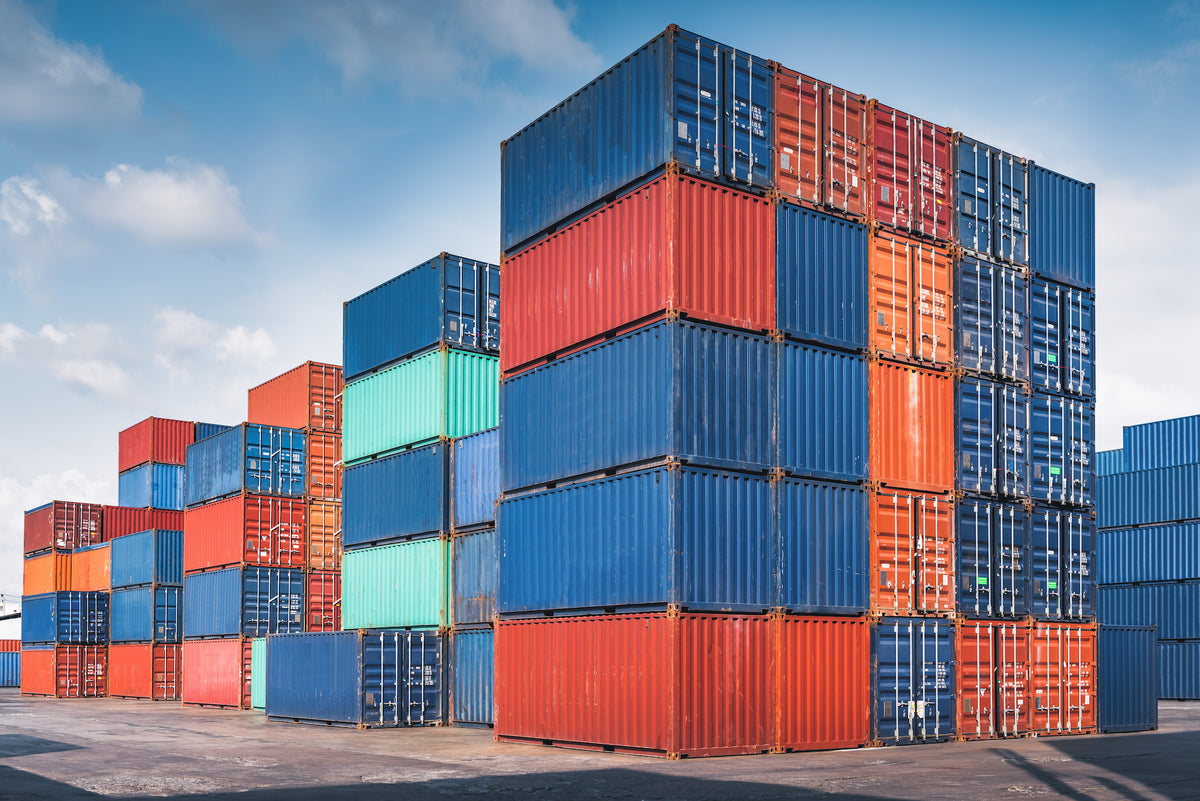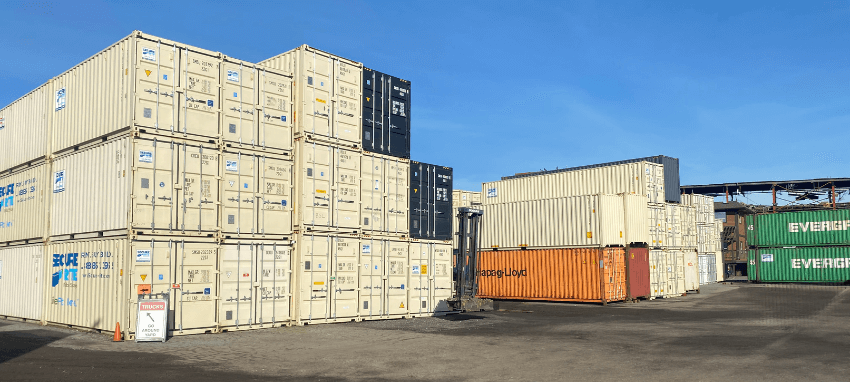The ultimate guide to shipping container storage for logistics professionals
Wiki Article
Whatever You Need to Understand About Shipping Containers and Their Practical Applications
Shipping containers have advanced from mere tools for transport to functional frameworks with countless useful applications. Their durable layout and conventional sizing make them suitable for a variety of usages past shipping. From ingenious housing options to lasting farming, their flexibility is significant. The possibilities do not end there. Exploring their numerous functions discloses unusual understandings right into creative solutions and modern obstacles. What various other functions could these containers play in today's globe?The Style and Framework of Shipping Containers

Inside, containers are designed to make best use of room, usually including wooden or steel flooring that can sustain considerable weight. Air flow systems might be integrated to avoid wetness accumulation, which is vital for sensitive freight. Furthermore, enhanced corners permit very easy handling by cranes and forklifts, helping with seamless loading and discharging. This thoughtful style and structure add to the containers' flexibility across various delivery and storage applications.
Benefits of Utilizing Shipping Containers
While many transportation approaches have their advantages, the usage of shipping containers sticks out because of their unmatched flexibility and efficiency. Shipping containers use a standard size, making them easy to carry and stack throughout various settings of transportation, consisting of trucks, ships, and trains. This standardization minimizes packing and discharging times, thereby boosting total productivity.Shipping containers are constructed from long lasting materials, supplying durable security for products throughout transportation. They are secure and weather-resistant, minimizing the danger of damage from environmental factors or theft. Additionally, the modular layout of shipping containers enables simple customization, enabling businesses to adjust them for various functions, such as storage space or mobile workplaces.
Their mobility and cost-effectiveness make delivery containers an attractive option for companies looking to enhance logistics and supply chain procedures. These advantages contribute to the expanding appeal of shipping containers in different sectors.
Imaginative Housing Solutions With Shipping Containers
Innovative real estate remedies have emerged as an amazing application of shipping containers, leveraging their intrinsic toughness for property use. These flexible frameworks offer a sustainable option to typical building products, frequently at a fraction of the expense. Developers and engineers have actually changed containers right into fashionable, practical homes, catering to varied way of lives and preferences.

Additionally, delivering containers are ecologically friendly, promoting recycling and lowering waste. Many projects concentrate on energy performance, including eco-friendly roofing systems and solar panels. As urbanization increases, these ingenious real estate options present a practical feedback to housing scarcities while fostering a distinct architectural visual.
Shipping Containers in Retail and Pop-Up Shops
An expanding variety of merchants are turning to shipping containers as a vibrant remedy for pop-up stores and retail rooms. These flexible frameworks provide an economical option to traditional store fronts, enabling services to create one-of-a-kind, eye-catching settings that attract consumers. Their modular design enables very easy transportation and installment, making them perfect for seasonal or momentary retail places.Retailers can tailor delivery containers to show their brand identification, transforming them into visually appealing stores that stick out in jampacked marketplaces. The portable nature of containers likewise encourages reliable usage of space, permitting innovative formats that optimize customer flow and engagement. Shipping containers can be located in unique places, such as metropolitan parks or vacant great deals, boosting availability and foot web traffic.

As the retail landscape develops, delivering containers provide a ingenious and adaptable option that fulfills the needs of contemporary customers while enhancing the shopping experience.
Sustainable Farming Practices Making Use Of Shipping Containers
Lasting farming practices increasingly incorporate shipping containers as innovative options for farming - sea can for sale. These container ranches use hydroponics to make best use of area and resource effectiveness, offering a cost-efficient strategy to food production. By changing delivery containers right into agricultural hubs, farmers can deal with food protection and ecological concerns all at onceContainer Farming Conveniences
wikipedia reference While standard agriculture encounters difficulties such as land scarcity and climate change, container farming presents a practical choice that makes the most of room and resources. This innovative approach enables for year-round plant production in regulated environments, lowering reliance on climate condition. Container ranches make use of less water than conventional farming, advertising sustainability and preservation. They can be established in metropolitan areas, bringing fresh produce closer to consumers and reducing transportation emissions. Additionally, the modular nature of shipping containers enables scalability, permitting farmers to readjust procedures based upon demand. Container farming also minimizes chemical usage by developing an enclosed ecological community, ultimately improving food safety. As metropolitan populaces grow, container farming emerges as a sensible option to satisfy the increasing demand for neighborhood, sustainable food resources.Hydroponics in Containers
Hydroponics, which allows plants to grow without soil by using nutrient-rich water, grows within the confines of shipping containers, making it an ideal technique for metropolitan farming. These containers produce a regulated atmosphere that optimizes temperature level, moisture, and light, enabling year-round farming. With limited room in city locations, shipping containers use a scalable solution for expanding fresh fruit and vegetables. Hydroponic systems within containers can include numerous methods, such as nutrient film technique (NFT) and deep water society (DWC), which make the most of yield while lessening water use. This cutting-edge approach not only enhances food security but also lowers the carbon impact connected with traditional farming techniques. Hydroponics in containers represents a forward-thinking remedy for sustainable urban food manufacturing.Cost-efficient Agriculture Solutions
As food manufacturing deals with enhancing challenges due his response to climate modification and urbanization, shipping containers arise as a cost-efficient service for agriculture. These versatile frameworks can be repurposed for numerous lasting farming techniques, such as hydroponics and vertical farming. By making use of controlled settings within containers, farmers can maximize development cycles and decrease source usage, including water and fertilizers. Furthermore, shipping containers can be purposefully placed in urban locations, lessening transportation prices and improving accessibility to fresh fruit and vegetables. Their modular nature permits scalability, making it possible for farmers to expand procedures as demand grows. Additionally, repurposing containers adds to lose decrease, lining up with green farming efforts. Generally, shipping containers present ingenious opportunities for effective and lasting food manufacturing.Emergency and Catastrophe Relief Applications of Shipping Containers

Organizations often make use of delivery containers to develop mobile centers or field health centers, making sure that healthcare gets to those in demand. In addition, they can be changed into command centers for coordinating rescue procedures, therefore improving organizational effectiveness during dilemmas.
Additionally, containers can be changed to save essential items such as food, water, and garments, safeguarding materials until they blog here are distributed. Their flexibility allows them to be quickly carried to numerous places, ensuring that assistance gets here where it is most quickly needed. In general, delivery containers play a critical duty in boosting the effectiveness of disaster relief initiatives worldwide.
Frequently Asked Questions
Just How Are Shipping Containers Transported From One Location to One More?
Shipping containers are carried via ships, trains, and trucks, using cranes for unloading and packing. This multi-modal transportation system makes certain reliable movement across land and sea, connecting worldwide supply chains and facilitating global profession.What Is the Typical Life Expectancy of a Shipping Container?
The average lifespan of a shipping container usually varies from 10 to 25 years, depending on upkeep, use, and ecological aspects. Appropriate care can extend their functionality, while disregard may result in wear and tear and damage.Can Shipping Containers Be Modified for Various Usages?
Yes, delivering containers can be customized for numerous usages. They work as homes, workplaces, pop-up stores, and storage systems. Their versatility permits imaginative adaptations, making them ideal for a vast array of applications.Are Shipping Containers Eco-friendly?
Shipping containers can be eco-friendly, as they promote repurposing and reusing. Their sturdiness lowers waste, while their usage in alternative housing and organizations minimizes the need for new materials, adding to sustainable methods.How Do I Pick the Right Size Shipping Container?
To pick the ideal size shipping container, one must analyze storage demands, consider the designated use, and review area schedule - shipping containers for sale near me. Typical dimensions include 20-foot and 40-foot containers, each serving different storage and transportation demands effectively
Cutting-edge housing services have emerged as an exciting application of delivery containers, leveraging their inherent toughness for domestic usage. The flexibility of shipping containers permits for creative designs, from single-unit homes to complex multi-container setups. Sustainable farming practices increasingly incorporate delivery containers as cutting-edge services for farming. Furthermore, the modular nature of delivery containers makes it possible for scalability, allowing farmers to change operations based on need. Hydroponics, which enables plants to grow without dirt by using nutrient-rich water, thrives within the boundaries of shipping containers, making it a perfect technique for urban farming.
Report this wiki page